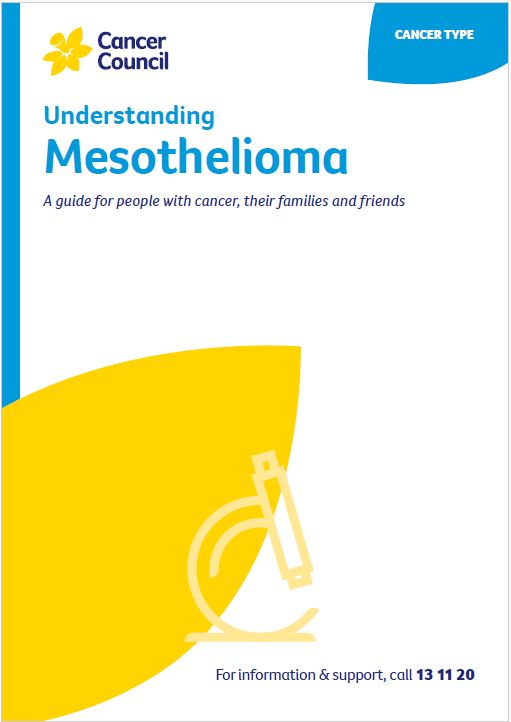- Home
- Peritoneal mesothelioma
- Diagnosis
- Tests
- Other tests
Other tests for peritoneal mesothelioma
We discuss some other tests that may be used to diagnose peritoneal mesothelioma.
Learn more about:
PET scan
A PET (positron emission tomography) combined with a CT scan may be used to see how far mesothelioma has spread. It is usually available at major hospitals.
How it’s done – A small amount of radioactive glucose solution is injected into a vein, usually in your arm. You will sit quietly for 30–90 minutes as the glucose solution travels around your body. You then lie on a table that moves through the scanning machine very slowly. Cancer cells take up more of the glucose solution than normal cells, so they show up brighter on the scan. This test is painless.
Molecular tests and special stains
To confirm a diagnosis of mesothelioma, the pathologist sometimes needs to do further tests on the tissue sample. These are known as molecular tests and special stains. They look for specific molecules that help to tell mesothelioma apart from other types of cancer.
Diagnosis from fluid samples
Sometimes a fluid sample may be used to help make a diagnosis of mesothelioma – particularly if you are not well enough to have a biopsy. In this case, fluid is collected at the same time as draining the pleural or peritoneal cavity.
It can be hard to diagnose mesothelioma from these fluid samples, because abnormal mesothelioma cells often look similar to other cells. To be as accurate as possible, this technique should be done at a specialist centre. This is because a large volume of fluid must be collected, and the results have to be combined with information from an x-ray and CT scan.
Sometimes, even after several tests, doctors may be unsure of the diagnosis and some tests may need to be repeated. This is common when trying to diagnose mesothelioma.
→ READ MORE: Staging and prognosis for peritoneal mesothelioma
Podcast: Tests and Cancer
Listen to more episodes of our podcast for people affected by cancer
More resources
All updated content has been clinically reviewed by A/Prof Anthony Linton, Medical Oncologist, Concord Cancer Centre and Concord Repatriation General Hospital, NSW; Dr Naveed Alam, Thoracic Surgeon, St Vincent’s Private Hospital Melbourne and Monash Medical Centre, VIC; Prof David Morris, Peritonectomy Surgeon, St George Hospital and UNSW, NSW. This edition is based on the previous edition, which was reviewed by the following panel: A/Prof Anthony Linton (see above); Dr Naveed Alam, (see above); Donatella Arnoldo, Consumer; Polly Baldwin, 13 11 20 Consultant, Cancer Council SA; Dr Melvin (Wee Loong) Chin, Medical Oncologist, Sir Charles Gairdner Hospital and National Centre for Asbestos Related Diseases, WA; Prof Kwun Fong, Thoracic and Sleep Physician and Director, UQ Thoracic Research Centre, The Prince Charles Hospital, and Professor of Medicine, The University of Queensland, QLD; Vicki Hamilton OAM, Consumer and CEO, Asbestos Council of Victoria/ GARDS Inc., VIC; Dr Susan Harden, Radiation Oncologist, Peter MacCallum Cancer Centre, VIC; Penny Jacomos, Social Worker, Asbestos Diseases Society of South Australia, SA; Prof Brian Le, Director, Parkville Integrated Palliative Care Service, The Royal Melbourne Hospital and Peter MacCallum Cancer Centre, VIC; Lung Cancer Support Nurses, Lung Foundation Australia; Jocelyn McLean, Mesothelioma Support Coordinator, Asbestos Diseases Research Institute, NSW; Prof David Morris (see above); Joanne Oates, Registered Occupational Therapist, Expert Witness in Dust Diseases, and Director, Evaluate, NSW; Chris Sheppard and Adam Barlow, RMB Lawyers.
View the Cancer Council NSW editorial policy.
View all publications or call 13 11 20 for free printed copies.

